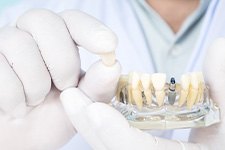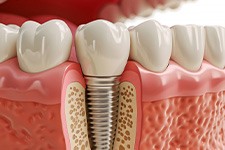Dental Implants – Canton, MI
Enjoy Smiling Again After Tooth Loss
Losing even one tooth, let alone several or all of them, can devastate your self-esteem. Your incomplete smile can lead to embarrassment in social situations, but that’s far from the only concern. Missing teeth also cause complications below the surface of your gums. At Robison Dental Group, we can preserve your oral health and rebuild your smile using a tooth replacement that looks and feels 100% realistic – dental implants. If you’d like to enjoy smiling again after tooth loss, give us a call to learn more about dental implants in Canton, MI!
Why Choose Robison Dental Group for Dental Implants?
- Partnered with the Best Dental Implant Experts in Canton
- Serving Canton Families Since the 1940s
- Flexible, Low-Interest Dental Financing Options
What Are Dental Implants?

Dental implants are the only tooth replacement method that brings back the entire structure of your missing teeth – not just the part above the gumline. The dental implant itself is a titanium post that is surgically placed into your jawbone to act as a new tooth root. Your jawbone will fuse to the post over the next few months through a process called osseointegration. After your jaw has healed, a connector piece called an abutment is placed on top of the implant to secure your custom-made crown, bridge, or denture. Thanks to their unique three-part structure and sturdy foundation in the jawbone, dental implants are able to function like real teeth and can potentially last for a lifetime!
The 4-Step Dental Implant Process

The dental implant process is a complex one that can vary from one patient to another, and it can take several months to complete. However, each treatment plan will typically consist of the same four basic steps to ensure successful results. Read on to learn the essential stages of the dental implant process and what to expect during each.
Initial Dental Implant Consultation

Dr. Robison will first go over your smile goals, take X-rays of your mouth and jaw, determine your eligibility for dental implants, and walk you through the treatment process. Our team will have to verify that your jawbone density is sufficient enough to support the metal posts. If necessary, you might even require preliminary services, such as gum disease treatment or bone grafting, if your mouth isn’t already healthy or strong. Once we’ve helped you achieve great oral health, we can move forward with planning your surgical portion.
Dental Implant Surgery

You’ll be referred to one of our partnered oral surgeons or periodontists to have the implant posts surgically placed in your jaw. Before beginning your procedure, your team will administer a local anesthetic so that you don’t feel pain throughout your treatment. You might even be provided with sedation dentistry to remain completely calm and relaxed. Once you’re in good condition, your surgeon will make a small incision in your gums to reach the jawbone where they’ll place your implants and suture your gums closed around them. They’ll provide you with specific guidelines for your recovery before having your friend or family member take you back home.
Dental Implant Osseointegration & Abutment

Over the next four to six months, your jawbone grows around the implants, creating a lasting foundation. This is through a process called osseointegration, which will create the stability needed to support your future restorations or prosthetics indefinitely. After you’ve completely recovered, you’ll return to our office to receive your abutments—small metal connector pieces that will link your restoration(s) to your implants. Then you’ll be sent home to allow your gums to heal.
Delivery of Dental Implant Restoration(s)

You’ll return to our office to have Dr. Robison complete your smile with a personalized dental crown, bridge, or denture. Our team will confirm that your results fit perfectly and that you’re entirely satisfied with your treatment before sending you on your way. We’ll also give you instructions on how to maintain your implants so that you can make the most of them.
Benefits of Dental Implants

As the only solution to mimic the roots of missing teeth in addition to the crowns, dental implants provide a variety of benefits over other options. These benefits include:
- Dental implants have over a 95% success rate to last for several decades.
- Your restoration is made of all-ceramic material to ensure it looks natural.
- Regain as much as 70% of your natural biting force to enjoy your favorite foods again.
- The implant post stimulates your bone to preserve your jaw’s density.
- Prevents your remaining teeth from drifting out of place.
- Supports your facial tissues to maintain a youthful appearance.
- Cost-effective treatment that, with the right aftercare, should never need to be replaced.
- Easy maintenance and care to ensure it lasts for years.
Who Dental Implants Can Help

Pretty much any healthy adult suffering from tooth loss can benefit from dental implants, as they can be used to replace any number of missing teeth. Which type is right for you? Dr. Robison can help you choose from the following options based on your specific needs:
Missing One Tooth

A single dental crown can be attached to an implant post using a small connector called an abutment. Unlike with a dental bridge, this new tooth won’t require the surrounding ones to be altered in any way, nor will it need them for support, better preserving a patient’s natural smile.
Missing Multiple Teeth

With just two dental implants, we can replace three or more missing teeth in a row. Two dental crowns will be positioned on either side of the gap in a patient’s smile, and these will support a strong and reliable bridge. Implant bridges not only look more natural than traditional ones, but they can be trusted to last longer as well.
Missing All Teeth

Instead of replacing each tooth individually, just four to six implants can be used to secure a full denture directly to the jawbone. Implant-supported dentures have a much stronger hold than a traditional removable prosthetic. Plus, they can help bring back more of a patient’s bite strength, enabling them to enjoy a more varied diet with ease.
Understanding the Cost of Dental Implants

Dental implants are quite versatile and able to help patients with varying degrees of tooth loss, and because of this, the overall cost of the treatment can be quite different from person to person. Factors such as how many teeth a patient wants to be replaced, where they are located in the mouth, and what kind of restoration is used can all influence the final price.
While dental implant restorations do tend to cost more than other traditional options, they are actually the best financial choice long-term. Why? Largely thanks to their longevity. Regular bridges and dentures typically need to be completely redone every seven to 10 years, multiplying their costs, while dental implants can be expected to last for 30 years or more. As a result, dental implant patients are able to avoid the periodic maintenance and retreatments required by other restorations, saving them thousands over time.
Types of Dental Implants

Dental implants are a versatile tooth replacement solution that can fill a small gap in one’s teeth or restore an entire smile. The type of implant a patient needs to restore their smile will influence the final cost of treatment. For example, a single implant and crown to fill the gap left by a missing tooth typically costs less than an implant denture, which relies on four to six implants to remain in place.
What Are the Stages of Dental Implant Treatment?

The first step of dental implant treatment is to schedule an initial consultation with a dentist in Canton. Once the dentist has thoroughly examined your teeth and mouth and discussed your smile goals, dental implantation typically proceeds as follows:
- Stage 1 – Placement of the dental implant(s) by a specialist
- Stage 2 – Healing period of several months
- Stage 3 – Possible addition of an abutment to connect the implant(s) with a crown, bridge, or denture
- Stage 4 – Placement of the final restoration
As you can see, the dental implant process is completed over several months. Each trip to the dentist may incur a unique cost that will vary from case to case.
Furthermore, it is important to note that candidates for dental implants must be in excellent oral health before beginning treatment. Patients with gum disease, a weak jawbone or other oral health issues that could impede successful implantation must partner with their dentist to address these issues first. If gum disease therapy or a bone graft is necessary, this will add to the overall cost of implant treatment.
Are Dental Implants Worth the Investment?

The answer to this question is a resounding “yes”! Although alternatives such as dentures and traditional bridges may cost less, nothing can match the maximum stability, natural appearance, and restored function that dental implants provide. Dental implants are the only treatment that replaces both the tooth root and the visible portion of the tooth.
In addition, with proper care, dental implants can last decades – or even a lifetime! Bridges and dentures, on the other hand, typically must be replaced about every 10 years. So, although their upfront cost may be higher compared to dentures or bridges, over the long-term dental implants can represent the most cost-effective restorative treatment!
Does My Dental Insurance Cover Dental Implants?

Many dental insurance plans do not yet provide full coverage for dental implants. However, you may be able to take advantage of your insurance benefits for certain stages of the process – such as the initial consultation with Dr. Robison or if you need gum disease therapy prior to implantation.
At Robison Dental Group, we believe dental implants in Canton should be an affordable treatment option for everyone. That is why we are proud to offer flexible in-house financing plans and accept payments plans through CareCredit and LendingClub. If you want to explore either of these options or need assistance understanding your dental insurance coverage, do not hesitate to contact our experienced and knowledgeable team!
Dental Implant FAQs

Choosing dental implants to replace your missing teeth is a big decision. It is natural to have plenty of questions about the treatment and process to complete your smile. We want you to feel confident in your dental prosthetic choice. We take the time to carefully answer your questions and address your concerns. We have the FAQs you need about dental implants to make the right choice for your smile.
What makes dental implants different?
Traditional replacement options only treat the visible portion of the tooth. Dental implants go a step further to replace both the root and the crown. This allows them to offer exceptional benefits when compared to conventional treatments.
A dental implant post mimics the root of your tooth. This stimulates your jaw to encourage new growth. Not only does this protect your facial structures and preserve your bone density, but it also supports your remaining natural teeth to reduce the risk of tooth decay, gum disease, and additional tooth loss.
How many teeth can dental implants replace?
Your dentist in Canton, Dr. Robison, can use dental implants to treat all cases of tooth loss; however, the process varies slightly depending on how many teeth you are replacing. A single tooth is treated using an implant post, an abutment, and a crown. If you are missing more than one tooth in a row, a dental bridge is secured to your jawbone using an average of one or two implant posts. You can even anchor an entire denture using four implant posts.
Am I a good candidate for dental implants?
Generally, if you have good oral and general health, you are a candidate for dental implants, but you will need a comprehensive consultation. The long-term success of the treatment relies on your body’s ability to heal and remain infection-free. Your jawbone must also be able to support the implant posts. As a result, you cannot have any medical conditions that impact your body’s ability to heal and fight infections. If your jawbone’s density is compromised, you may need a bone grafting procedure to become a candidate for dental implants.
How much do dental implants cost?
There is no set price for dental implants because the amount is based on your individual treatment plan. There are several factors that influence the price, such as the number of teeth you are replacing, if any additional procedures are needed, and your dental coverage. We help you maximize the value of your insurance policy to reduce the amount you need to pay. We accept a variety of payment options to cover any remaining balance to keep your new smile affordable.
